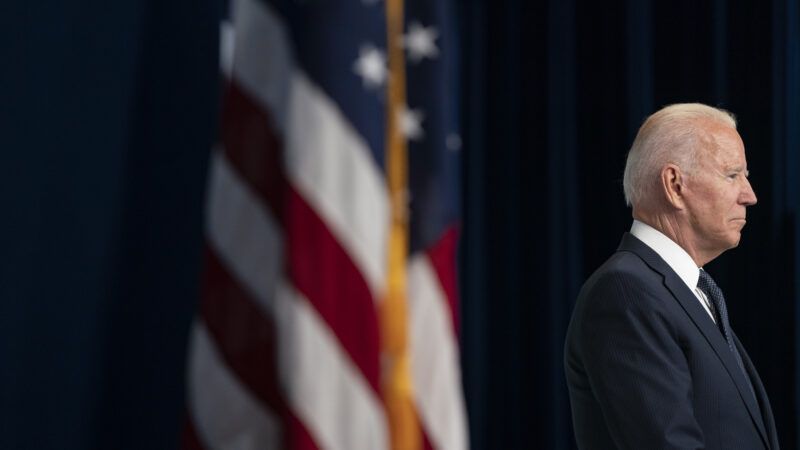Biden Admits Some Asylum Seekers but Won't Say Who Qualifies for Entry
The administration's processing of asylum claims is shrouded in mystery.

Though he has made some welcome changes to his predecessor's immigration policies, President Joe Biden has kept many in place—and enacted questionable ones of his own. Case in point: Biden is now allowing a trickle of asylum seekers to enter the U.S. from Mexico, but it's unclear why some people may come and others may not.
The Associated Press reported in June that the Biden administration had quietly recruited six humanitarian groups to recommend which migrants should be allowed into the U.S. and initiate the asylum-seeking process. Only one of those groups—the International Rescue Committee—was publicly identified. According to the A.P.'s anonymous sources, the others are the London-based Save the Children, the American organizations HIAS and Kids in Need of Defense, and two Mexican groups, Asylum Access and the Institute for Women in Migration. Though the U.S. government has final say over who receives asylum, it relies on those organizations' referrals.
Officials have not publicly confirmed that these are the responsible groups, and the criteria the organizations are using to select lucky entrants are just as fuzzy. The administration has reportedly asked them to prioritize migrants with serious medical issues, migrants who face imminent danger, and members of marginalized groups. But no guidance has been published, and many of the selected migrants "fall outside those categories."
Under domestic and international law, all migrants who present themselves at U.S. ports of entry or on American soil are granted the opportunity to make asylum claims. Eligibility for asylum hinges on proving you've been persecuted on the grounds of race, religion, nationality, membership in certain other social groups, or political opinion. That process ground to a halt during the pandemic, after the Trump administration implemented Title 42. This policy—which Biden has maintained—allows Customs and Border Patrol officials to expel migrants immediately upon arrival and bar them from arguing their vulnerability before U.S. immigration officials.
Vulnerability is a slippery concept, and it is understandably difficult to rank among migrants. Is it worse to be gay in Honduras, a political dissident in El Salvador, or a religious outsider in Guatemala? Rather than let migrants present their cases to the government, as is their right through the asylum-seeking process, the administration has outsourced the difficult task to organizations with far fewer resources.
Biden's system has also created perverse incentives. The A.P. reports that an advocacy group working at a border camp in Tijuana originally gave selected migrants "laminated cards that put them in a queue to claim asylum." It halted that process when the card issuers learned "profiteers were selling them for $500 to $1,000 each." That group also had to pivot and look for vulnerable people in "migrant shelters, hoping to dispel beliefs that the best chances of getting picked are at the increasingly dangerous and unsanitary camp."
Letting a handful of people fleeing danger into the U.S. is better than admitting none. But it would be far better to return to the old asylum system and the legal obligations to migrants it entailed.


Show Comments (22)